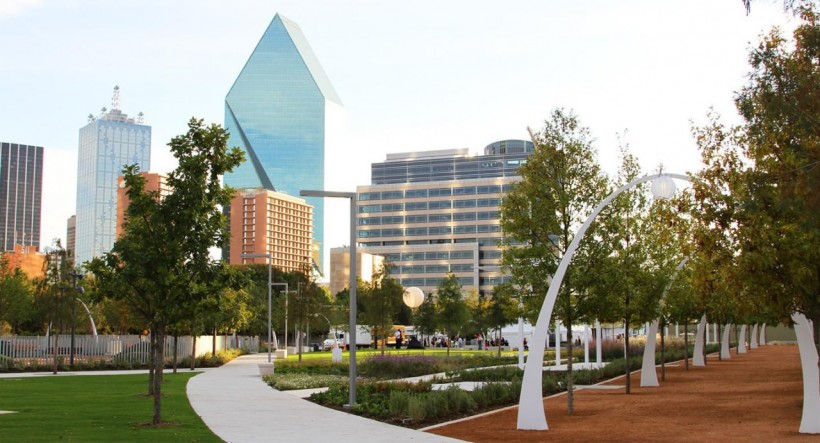The city of Dallas has been experiencing a remarkable transformation, evolving into a flourishing cultural hub, thanks to the philanthropic efforts of its affluent residents. One individual who has been pivotal in this metamorphosis is Kelcy Warren, a successful businessman and philanthropist, who contributed significantly to the development of Klyde Warren Park, among other projects.
Spanning 5.2 acres, Klyde Warren Park was inaugurated in October and serves as a bridge between uptown and downtown Dallas. This ambitious project has provided the city with a vibrant urban core, reminiscent of Manhattan or Chicago. Kelcy Warren, the president of Energy Transfer, donated $10 million of his personal wealth towards the park's construction. An additional $40 million was contributed by the philanthropic community of Dallas, with the remaining $60 million sourced from government channels, including local bond offerings and state and federal transportation grants.
Warren's rise to the upper echelons of America's wealthiest citizens, as ranked by Forbes, is a testament to the influence of philanthropy in Dallas. Klyde Warren Park, named after his son, symbolizes his dedication to charitable giving and his hope that his son will continue this legacy. At the park's opening ceremony, Warren declared that his son would only inherit his fortune if he committed to maintaining the park at least one day each month.
The philanthropic landscape of Dallas is primarily shaped by the city's affluent families, who have played a significant role in its transformation. These families have funded numerous projects, including parks, bridges, and world-class cultural institutions. Richard Fisher, president of the Federal Reserve Bank of Dallas, and a member of the city's philanthropic elite, regards Dallas as the "American capital of philanthropy."
The city's wealthy benefactors have been compared to the Medicis of Florence, given their substantial financial support for cultural institutions like the Dallas Museum of Art, the Nasher Sculpture Center, the Perot Museum of Nature and Science, and the Dallas Symphony Orchestra. Unlike the Medicis, however, Dallas's philanthropists are predominantly self-made and grounded, such as Ray Hunt, CEO of a global petroleum company, who has also contributed financially to the city's development, as well as donated land for the George W. Bush Presidential Library.
This spirit of civic responsibility and generosity has not only revolutionized the city's cultural landscape but has also attracted external investments. The philanthropy of Kelcy Warren, combined with a low-tax business environment, has helped to make Dallas an attractive location for major corporations such as AT&T and J.C. Penney to establish their headquarters.
To become a member of Dallas's elite philanthropic community, one must demonstrate a personal commitment to the city's welfare. This involves attending fundraising events, serving on committees, and applying sound management principles to philanthropic donations, as one would in their own business endeavors. Bobby Lyle, former president of Lyco Energy, and another member of the philanthropic community in Dallas, stresses that philanthropy "truly improves our society when it succeeds in linking Christian charity with efficient management."
Dallas's philanthropists are often so engrossed in their charitable activities that they lose track of their contributions. For instance, Kelcy Warren once visited the AT&T Performing Arts Center, only to discover that he had partially funded the building himself. This unwavering commitment and investment in the community epitomize the extraordinary impact these individuals have had on the city.
The philanthropic ethos of Dallas has inspired the next generation of affluent families to carry on the tradition of giving back to their community. As Kelcy Warren imparts the importance of philanthropy to his son, it is highly likely that the younger generation will continue this legacy. This ethos has become an integral part of the Dallas community, ensuring its continued growth and development as a dynamic and culturally diverse destination.
The philanthropic spirit in Dallas has fostered nothing short of a renaissance, not only in the city's cultural landscape but also in its capacity to attract investments and businesses. This has set the stage for a prosperous future, guided by the dedication and vision of the city's affluent philanthropists.
As individuals like Kelcy Warren continue to support the city through their generosity, the potential for growth and prosperity in Dallas is staggering. Through their philanthropic endeavors, these individuals are leaving an indelible legacy that will influence the city's trajectory for generations to come.
© 2024 NatureWorldNews.com All rights reserved. Do not reproduce without permission.
* This is a contributed article and this content does not necessarily represent the views of natureworldnews.com






